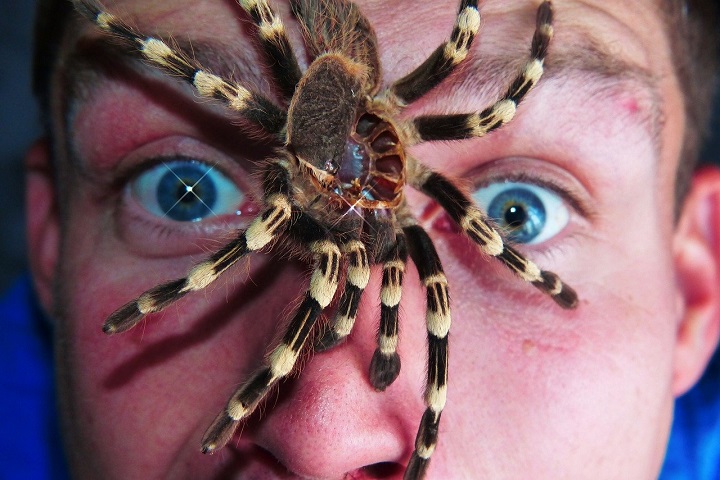Zoophobia or animal fear is a class of explicit fears of specific animals, irrational fear, or even essentially dislike of any non-human animals. Examples of specific zoophobias would be entomophobias, for instance, bees (apiphobia). Fears of spiders (arachnophobia), birds (ornithophobia), and snakes (ophidiophobia) are likewise common.
See the article at -phobia for the list of different phobias. Sigmund Freud referenced that an animal phobia is one of the quite possibly psychoneurotic diseases among children.
1. Webcomic / Zoophobia
Zoophobia is a fantasy/humor webcomic by Vivienne “Vivziepop” Medrano (later of Hazbin Hotel fame) about a neurotic young lady named Cameron who, when desperate for a job, winds up being unexpectedly thrust into Safe Haven, a fabulous world full of incredible beasts, unimaginable beings and zany characters.
She gets a career as a guidance counselor at the Zoo-Phoenix Academy, where she faces head-on a colorful cast of talking animals and strange creatures. Unfortunately, Cameron has quite the terrible zoophobia case and is ultimately terrified by the very students and staff she should work with.
Now Has a Character Page!
The comic is present on an indefinite hiatus, with an animated series of shorts being uploaded to Vivziepop’s YouTube channel. The primary short, the musical “Bad Luck Jack”, was uploaded on September 30, 2020.

Zoophobia Is a Subset of Specific Phobias. Some Examples of Particular Zoophobias Include:
- Arachnophobia (fear of spiders)
- Apiphobia (fear of bees)
- Cynophobia (fear of dogs)
- Entomophobia (fear of insects)
- Ichthyophobia (fear of fish)
- Musophobia (fear of mice and rats)
- Ornithophobia (fear of birds)
- Ophidiophobia (fear of snakes)
2. Evolutionary Factors:
Human evolution may have a task to play as to why we develop such fears. Since the early days, animals have been viewed as dangerous and harmful and threatening to life. Fear is a natural defense mechanism we have developed for survival.
Regardless of domesticating some of them, animals’ fear has not been eliminated and is still in our genes. When it goes overboard, one can have zoophobia. Zoophobia can happen in both children and adults,
3. Zoophobia Symptoms
People with zoophobia can experience panic attacks with visible physical signs, for example, sweating, inconvenience breathing, nausea or vomiting, trembling, racing heartbeat, abdominal uneasiness, dizziness or fainting
- Intense fear upon seeing an animal, even in an image that triggers nervousness.
- Avoid a place with animals, such as the zoo.
- Quick response in terms of screaming, crying and endeavors to run away.
- Realize that fear is irrational in adults.
- Thoughts of being attacked by an animal.
- Panic attacks with visible physical signs such as sweating, trouble in breathing, nausea or vomiting, trembling, racing heartbeat, abdominal uneasiness, dizziness, or fainting.

4. Causes of Zoophobia
Phobia of animals is normal and exists all around the world. Ordinarily, it emerges from an adverse childhood experience involving particular animal/s. In some cases, the fear determines on its own without any specific treatment. In additional extreme cases, the phobia endures lifelong.
The most basic reason behind acquiring Zoophobia is exceptional anxiety or stress in the individual’s mind. This feeling manifests deep into the brain and is recalled each time the individual is placed in a stressful situation. (This commonly includes being placed in the same environment as the animal the individual is afraid of).
It is fundamental to note that not all fear of animals can be labeled as Zoophobia. The latter is a persistent, unwarranted, and irrational fear of animals no matter how non-dangerous or harmless they are. In different cases, the fear of snakes and spiders can be considered very ordinary and vital.
When to Visit a Doctor?
If the above symptoms have been happening persistently for over six months, then you may need to consult with a doctor. Also, if your day-by-day chores involve pets and animals, and fearing them has affected your behavior, getting treatment would be the ideal activity.
5. Treating Zoophobia
Every individual who has Zoophobia must understand that s/he isn’t alone, and there are millions worldwide suffering from different types of Zoophobia. Fortunately, there are possibilities for treating phobia. Behavior therapy is one treatment that is known to be exceptionally useful. A few doctors or psychotherapists likewise suggest medication for treating the extreme anxiety experienced. However, these must be utilized as a last resort.

Progressive desensitization is another strategy that is known to be highly effective in treating the fear of animals. It includes subjecting the patient to pictures or images of the animal feared. Most of the time, this is done in a controlled climate so that the patient can handle extreme anxiety.
Aside from sedatives and antidepressants, meditation and positive perception are acceptable long-term solutions to overcome animal phobia. Talking about the fears or writing them down are also therapeutic and can assist one overcome Zoophobia.
Other Options
A mental health professional may suggest a mix of exposure therapy, CBT, and medication for individuals with various phobias or uneasiness issues.
Few Instances of Effective Medications for Anxiety Disorders Include:
antidepressants, for example, picky serotonin reuptake inhibitors and tricyclic antidepressants
beta-blockers, which help relieve anxiety symptoms such as hypertension and a quick heartbeat
tranquillizers, such as benzodiazepines
There is no one-size-fits-all treatment for zoophobia. Treatment plans are customized and address every individual’s unique symptoms, preferences, and way of life.
Although several effective medications are accessible for treating anxiety disorders, all pharmacological treatments carry some side effects. An individual should consult their doctor about the risks and advantages of various treatment choices before trying them.

